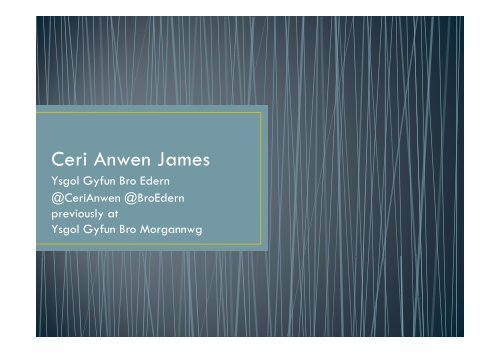Workshop - Ysgol Gyfun Bro Edern - LiNKS
Workshop - Ysgol Gyfun Bro Edern - LiNKS
Workshop - Ysgol Gyfun Bro Edern - LiNKS
- No tags were found...
You also want an ePaper? Increase the reach of your titles
YUMPU automatically turns print PDFs into web optimized ePapers that Google loves.
Ceri Anwen James<br />
<strong>Ysgol</strong> l<strong>Gyfun</strong> <strong>Bro</strong> <strong>Edern</strong><br />
@CeriAnwen @<strong>Bro</strong><strong>Edern</strong><br />
previously at<br />
<strong>Ysgol</strong> <strong>Gyfun</strong> <strong>Bro</strong> Morgannwg
Case Studies<br />
Bethan is about to start her fourth and final year at Sidney Sussex<br />
College, Cambridge, reading Modern and Medieval Languages<br />
(Russian and German). She has just spent a year in St Petersburg,<br />
working in the Hermitage as an intern.<br />
GCSE Courses: Welsh, Welsh Literature, English, English Literature,<br />
Maths, Biology, Chemistry, Physics, German (in year 10), Religious<br />
Studies, Art, French, History, IT<br />
A Levels: German (in year 12), Welsh First Language, English<br />
Literature, History, Maths, AS Religious Studies
Case Studies<br />
Jenny graduated in the summer from St John’s College, Oxford<br />
with a First Class Honours Degree in History. She is about to start<br />
a Masters Course at the University of Cork.<br />
GCSE Courses: Welsh, Welsh Literature, English, English Literature,<br />
Maths, Biology, Chemistry, Physics, German (in year 10), Religious<br />
Studies, Music, History, IT<br />
A Levels: German (in year 12), Welsh First Language, English<br />
A Levels: German (in year 12), Welsh First Language, English<br />
Literature, History, Music BTEC
Case Studies<br />
John has just started his second year at Cardiff University i studying<br />
medicine. During year 12 he spent a week in a hospital in<br />
Grünstadt, Germany on work experience. He also completed a<br />
week’s work experience in all of the following: Llandough<br />
Hospital, Princess of Wales Hospital and the Research Dept at<br />
Cardiff Uni School of Medicine. He also volunteered once a week<br />
for 18 months at <strong>Ysgol</strong> Erw Delyn, and with Penarth Lifeboat.<br />
GCSE Courses: Welsh, Welsh Literature, English, English Literature,<br />
Maths, Biology, Chemistry, Physics, German, Religious Studies,<br />
History, Geography, IT<br />
A Levels: Biology, Chemistry, Physics, AS German
Not …<br />
Why Oxford Why Cambridge<br />
But …<br />
Why History<br />
Why Russian<br />
Why Medicine
Up and beyond A Levels<br />
The A Level Syllabus is a starting point, not the end point<br />
Oxford and Cambridge expect the A Level syllabus to have been<br />
well taught and drilled, d therefore I have found A Level set texts or<br />
topics to be fairly insignificant in their interviewing process<br />
These questions are the important ones:<br />
Do pupils really have a personal passion for their chosen subject<br />
Are pupils really motivated t to explore their chosen subject further<br />
Are pupils able to apply their A Level skills to new areas easily<br />
Are pupils able to explain and justify themselves<br />
Are pupils able to sustain an argument
Jenny’s Oxford Interviews<br />
1.<br />
Personal Statement (included questions about German<br />
Department’s Berlin visit)<br />
Work Experience (although this is not usually covered in<br />
interviews)<br />
Discussions about books that Jenny had read independently, on<br />
matters not related to her A Level History course.<br />
Including: Benedict Anderson: Imagined Communities;<br />
Eric Hobsbawm: The Invention of Tradition …<br />
and ‘some stuff’ by Niall Ferguson
Jenny’s Oxford Interviews<br />
2.<br />
In-depth discussion on Jenny’s previously submitted A Level essay<br />
on Nazism. Originally written in Welsh for school, translated<br />
before being sent to Oxford<br />
Why History Why History Why History<br />
Discussion about given text about Napoleon, similar to History<br />
Aptitude Test, no previous knowledge required, but A Level skills<br />
to be applied to a new context
Jenny’s Oxford Interviews<br />
History questions:<br />
Why History<br />
How do you make History accessible<br />
Teaching History to the population via television series -v-<br />
Learning about History in the classroom<br />
Chronological l History -v- Experiences of History<br />
History through acting, museums etc<br />
Discussion i about submitted essay on Nazism<br />
Why do you think they have left parts of the Berlin Wall
Bethan’s Cambridge preparation<br />
Grammar, Grammar, more Grammar<br />
Reading, Reading, more Reading<br />
Daily tasks modelled d on the Cambridge tests: t Summary in<br />
German of an English text<br />
Daily tasks modelled on the Cambridge tests: Discussion in<br />
English of an excerpt of German literature<br />
Daily discussions on the extra-curricular literature read<br />
Mock interview in school with an external visitor (very general)<br />
Mock interview with me, combining all the tasks / discussions<br />
required in Cambridge<br />
Mock interview in Swansea University with my tutor, also<br />
combining all the elements of the Cambridge interview
Bethan’s Cambridge Interviews<br />
Why Russian Why Russian Why Russian<br />
X No questions at all about A Level set texts<br />
All questions about independently read literature / film …<br />
How accurate can the portrayal of life in East Germany be in<br />
the fl film Das Leben der Anderen, which h is a fictional account<br />
written by an Oxford educated West German<br />
Why does Woyzeck kill Maria in the play by Georg Büchner<br />
What parallels are there between the theme of fleeing in<br />
Alfred Andersch’s s Sansibar and in his fiction-based<br />
autobiography Die Kirschen der Freiheit
John’s Medicine Interviews<br />
Why Medicine Why Medicine Why Medicine<br />
What do you think are the differences between hospitals here<br />
and the hospital you visited i in Germany<br />
What are the differences between the NHS and an insurance<br />
based system<br />
How will being bilingual improve your communication skills as a<br />
medic How does learning German affect your communication<br />
Which procedures did you see in Germany and what were<br />
your observations<br />
What do you read to further your knowledge of the latest<br />
developments in medicine


